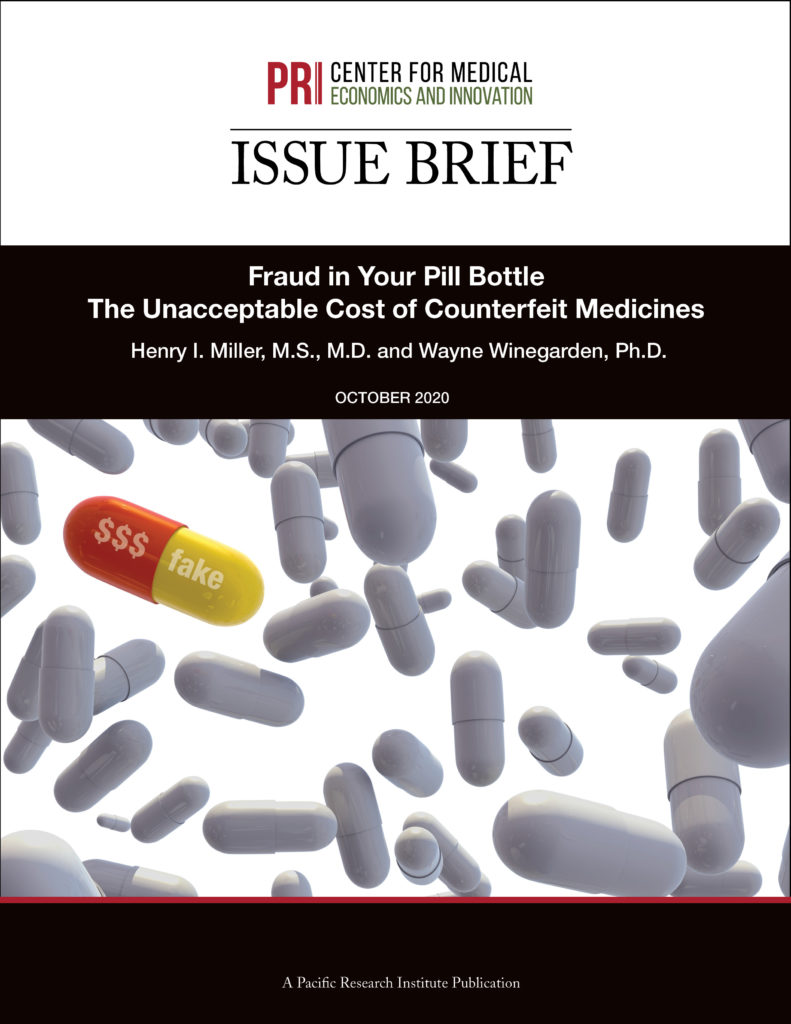NEW BRIEF: Counterfeit Drugs Harm Patients, Economy, Innovation
 A new brief released today by the Center for Medical Economics and Innovation at the nonpartisan Pacific Research Institute shows that counterfeit drugs put patients in harm’s way, hinder drug innovation, and lead to job losses. Proposals like drug importation or price controls, if implemented, would exacerbate the problem and result in more health and economic consequences.
A new brief released today by the Center for Medical Economics and Innovation at the nonpartisan Pacific Research Institute shows that counterfeit drugs put patients in harm’s way, hinder drug innovation, and lead to job losses. Proposals like drug importation or price controls, if implemented, would exacerbate the problem and result in more health and economic consequences.
Click here to download the brief
“Counterfeit drugs expose patients to potentially lethal contaminants, and may also increase public health risks by failing to effectively treat contagious diseases like COVID-19 or tuberculosis,” write the brief’s authors, Wayne Winegarden, Ph.D. and Henry I. Miller, M.S., M.D. “There are also negative economic impacts created by counterfeit drugs, including reduced pharmaceutical innovation, slower economic growth, and lost high-paying jobs.”
In “Fraud in Your Pill Bottle: The Unacceptable Costs of Counterfeit Drugs,” Winegarden and Miller note that counterfeit medications may look real, but do not contain enough – or any – of the prescribed medication’s active ingredient. Often, they contain harmful chemicals that could cause significant harm to the patient.
Based on estimates that total global counterfeit medication sales range between $200 billion and $431 billion annually, the authors document the economic costs of counterfeit medication. Their calculations show that counterfeit medications could result in between 6 and 28 new medicines not being created, up to $73.3 billion in lost R&D resources, $162.1 billion in lost revenue to U.S. industry and $353.3 billion in lost economic output, and as many as 247,803 lost jobs.
Proposals allowing for drug importation, they note, would open the drug supply chain to less secure sources and enable more counterfeit drugs to infiltrate the marketplace. Drug price controls would lead to drug shortages and increase the incentive to purchase from less secure online sources.
To combat the problem, they recommend that policymakers increase punishments for counterfeiting drugs, boost enforcement efforts, expand consumer education on the dangers of counterfeit drugs, and establish a “track and trace” system to make it harder to bring counterfeits into the U.S. market.
“Simply stopping the introduction of policies that will worsen the counterfeit drug problem is insufficient,” Winegarden and Miller conclude. “Government policies need to discourage the supply of, and demand for, counterfeit products by increasing the costs to counterfeiters, securing the drug supply chain, and educating the public.”

